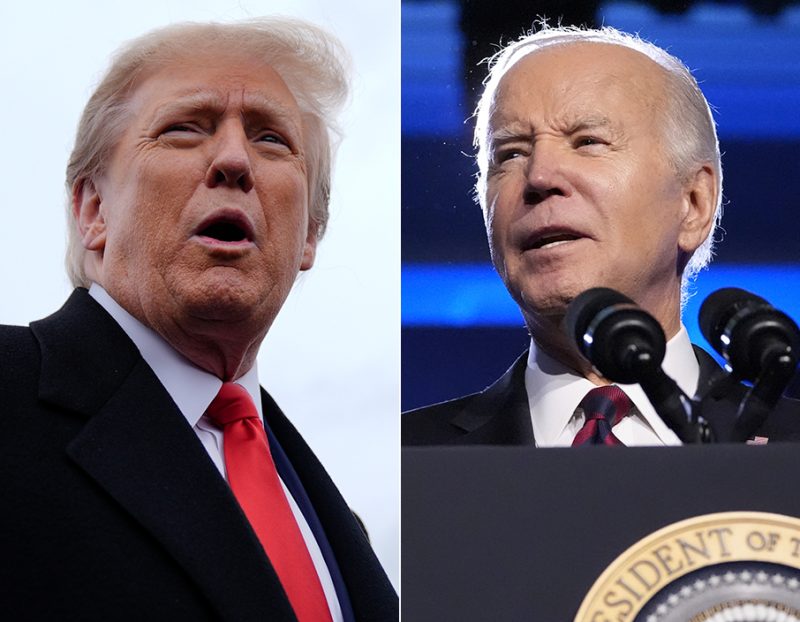January 30, 2024
Shockingly Electrifying Showdown: Biden vs. Trump in the Battle of Electric Vehicles and China’s Menacing Presence
 Section 1: Promoting Electric Vehicles (EVs)
In recent years, the global shift towards sustainable transportation has been gaining significant momentum, with electric vehicles (EVs) emerging as a promising solution to mitigate climate change. Both President Joe Biden and former President Donald Trump have laid out their respective visions on promoting EVs, albeit with some contrasting approaches.
Under the Biden administration, there has been a renewed emphasis on combatting climate change. Biden's ambitious plan includes investing heavily in the development and manufacturing of EVs. One of his key proposals is to allocate $174 billion towards EVs, aiming to promote the adoption of clean energy vehicles and establish a network of 500,000 EV charging stations by 2030.
By actively supporting the EV industry, Biden hopes to enhance the country's energy security, reduce greenhouse gas emissions, and generate thousands of new jobs in clean energy manufacturing, infrastructure, and research. Furthermore, he aims to incentivize consumers through tax credits and grants, making EVs more affordable and accessible to a wider range of Americans.
On the other hand, former President Trump also recognized the importance of EVs but advocated for a different approach. Rather than solely focusing on promoting EVs, Trump emphasized the importance of maintaining a balanced approach to energy sources. He encouraged the development of not only EVs but also traditional internal combustion engine vehicles, maintaining that diversity in energy sources is essential for a stable and secure economy.
Section 2: China's Threat in the EV Market
While the Biden and Trump administrations differed in approach towards promoting EVs domestically, they shared similar concerns regarding China's growing dominance in the global EV market. China has emerged as the world's largest EV market, controlling a significant share of the global supply chain, including battery production.
China's aggressive stance has raised concerns about its potential to leverage this dominance to gain economic and technological advantages, which could threaten American competitiveness in the EV sector. Both administrations recognized this threat and aimed for a more robust domestic EV industry to counter China's influence.
The Trump administration adopted a protectionist approach by implementing tariffs on Chinese imports, aiming to level the playing field for American EV manufacturers. Though controversial, these measures sought to safeguard American jobs and prevent intellectual property theft.
The Biden administration, while acknowledging the threat posed by China, has opted for a diplomatic and collaborative approach. Biden recognizes that addressing the China challenge requires strengthening America's own innovation and manufacturing capabilities. He intends to work closely with allies, such as the European Union and Japan, to develop common standards, set strict environmental regulations, and promote fair trade practices. By forging international alliances, Biden hopes to counter China's influence and ensure a level playing field for American EV manufacturers.
Section 3: Conclusion
The promotion of EVs and addressing China's growing dominance in the EV market are two crucial aspects where the Biden and Trump administrations had differing approaches. Biden's vision emphasizes substantial investments, widespread infrastructure development, and incentives to drive EV adoption. In contrast, Trump highlighted the importance of a diverse energy portfolio while implementing protectionist measures against China's unfair trade practices.
Both approaches have their merits and align with broader goals related to energy security, environmental preservation, and economic competitiveness. Ultimately, the success of EV promotion and tackling China's threat will depend on continued bipartisan efforts to enhance innovation, strengthen domestic production, and foster international collaborations.
Section 1: Promoting Electric Vehicles (EVs)
In recent years, the global shift towards sustainable transportation has been gaining significant momentum, with electric vehicles (EVs) emerging as a promising solution to mitigate climate change. Both President Joe Biden and former President Donald Trump have laid out their respective visions on promoting EVs, albeit with some contrasting approaches.
Under the Biden administration, there has been a renewed emphasis on combatting climate change. Biden's ambitious plan includes investing heavily in the development and manufacturing of EVs. One of his key proposals is to allocate $174 billion towards EVs, aiming to promote the adoption of clean energy vehicles and establish a network of 500,000 EV charging stations by 2030.
By actively supporting the EV industry, Biden hopes to enhance the country's energy security, reduce greenhouse gas emissions, and generate thousands of new jobs in clean energy manufacturing, infrastructure, and research. Furthermore, he aims to incentivize consumers through tax credits and grants, making EVs more affordable and accessible to a wider range of Americans.
On the other hand, former President Trump also recognized the importance of EVs but advocated for a different approach. Rather than solely focusing on promoting EVs, Trump emphasized the importance of maintaining a balanced approach to energy sources. He encouraged the development of not only EVs but also traditional internal combustion engine vehicles, maintaining that diversity in energy sources is essential for a stable and secure economy.
Section 2: China's Threat in the EV Market
While the Biden and Trump administrations differed in approach towards promoting EVs domestically, they shared similar concerns regarding China's growing dominance in the global EV market. China has emerged as the world's largest EV market, controlling a significant share of the global supply chain, including battery production.
China's aggressive stance has raised concerns about its potential to leverage this dominance to gain economic and technological advantages, which could threaten American competitiveness in the EV sector. Both administrations recognized this threat and aimed for a more robust domestic EV industry to counter China's influence.
The Trump administration adopted a protectionist approach by implementing tariffs on Chinese imports, aiming to level the playing field for American EV manufacturers. Though controversial, these measures sought to safeguard American jobs and prevent intellectual property theft.
The Biden administration, while acknowledging the threat posed by China, has opted for a diplomatic and collaborative approach. Biden recognizes that addressing the China challenge requires strengthening America's own innovation and manufacturing capabilities. He intends to work closely with allies, such as the European Union and Japan, to develop common standards, set strict environmental regulations, and promote fair trade practices. By forging international alliances, Biden hopes to counter China's influence and ensure a level playing field for American EV manufacturers.
Section 3: Conclusion
The promotion of EVs and addressing China's growing dominance in the EV market are two crucial aspects where the Biden and Trump administrations had differing approaches. Biden's vision emphasizes substantial investments, widespread infrastructure development, and incentives to drive EV adoption. In contrast, Trump highlighted the importance of a diverse energy portfolio while implementing protectionist measures against China's unfair trade practices.
Both approaches have their merits and align with broader goals related to energy security, environmental preservation, and economic competitiveness. Ultimately, the success of EV promotion and tackling China's threat will depend on continued bipartisan efforts to enhance innovation, strengthen domestic production, and foster international collaborations.
If you would like to delve into the world of investment topics , go to our partner project Wall Street Wizardry


